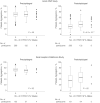Association of cytochrome P450 2C19 genotype with the antiplatelet effect and clinical efficacy of clopidogrel therapy
- PMID: 19706858
- PMCID: PMC3641569
- DOI: 10.1001/jama.2009.1232
Association of cytochrome P450 2C19 genotype with the antiplatelet effect and clinical efficacy of clopidogrel therapy
Abstract
Context: Clopidogrel therapy improves cardiovascular outcomes in patients with acute coronary syndromes and following percutaneous coronary intervention by inhibiting adenosine diphosphate (ADP)-dependent platelet activation. However, nonresponsiveness is widely recognized and is related to recurrent ischemic events.
Objective: To identify gene variants that influence clopidogrel response.
Design, setting, and participants: In the Pharmacogenomics of Antiplatelet Intervention (PAPI) Study (2006-2008), we administered clopidogrel for 7 days to 429 healthy Amish persons and measured response by ex vivo platelet aggregometry. A genome-wide association study was performed followed by genotyping the loss-of-function cytochrome P450 (CYP) 2C19*2 variant (rs4244285). Findings in the PAPI Study were extended by examining the relation of CYP2C19*2 genotype to platelet function and cardiovascular outcomes in an independent sample of 227 patients undergoing percutaneous coronary intervention.
Main outcome measure: ADP-stimulated platelet aggregation in response to clopidogrel treatment and cardiovascular events.
Results: Platelet response to clopidogrel was highly heritable (h(2) = 0.73; P < .001). Thirteen single-nucleotide polymorphisms on chromosome 10q24 within the CYP2C18-CYP2C19-CYP2C9-CYP2C8 cluster were associated with diminished clopidogrel response, with a high degree of statistical significance (P = 1.5 x 10(-13) for rs12777823, additive model). The rs12777823 polymorphism was in strong linkage disequilibrium with the CYP2C19*2 variant, and was associated with diminished clopidogrel response, accounting for 12% of the variation in platelet aggregation to ADP (P = 4.3 x 10(-11)). The relation between CYP2C19*2 genotype and platelet aggregation was replicated in clopidogrel-treated patients undergoing coronary intervention (P = .02). Furthermore, patients with the CYP2C19*2 variant were more likely (20.9% vs 10.0%) to have a cardiovascular ischemic event or death during 1 year of follow-up (hazard ratio, 2.42; 95% confidence interval, 1.18-4.99; P = .02).
Conclusion: CYP2C19*2 genotype was associated with diminished platelet response to clopidogrel treatment and poorer cardiovascular outcomes.
Trial registration: ClinicalTrials.gov NCT00370045 NCT00799396.
Figures




Comment in
-
Tailoring antiplatelet therapy based on pharmacogenomics: how well do the data fit?JAMA. 2009 Aug 26;302(8):896-7. doi: 10.1001/jama.2009.1249. JAMA. 2009. PMID: 19706866 No abstract available.
References
-
- Antman EM, Hand M, Armstrong PW, et al. Canadian Cardiovascular Society; American Academy of Family Physicians; American College of Cardiology; American Heart Association. 2007 focused update of the ACC/AHA 2004 guidelines for the management of patients with ST-elevation myocardial infarction: a report of the American College of Cardiology/ American Heart Association Task Force on Practice Guidelines. J Am Coll Cardiol. 2008;51(2):210–247. - PubMed
-
- King SB, III, Smith SC, Jr, Hirshfeld JW, Jr, et al. 2005 WRITING COMMITTEE MEMBERS. 2007 Focused Update of the ACC/AHA/SCAI 2005 Guideline Update for Percutaneous Coronary Intervention: a report of the American College of Cardiology/American Heart Association Task Force on Practice Guidelines: 2007 Writing Group to Review New Evidence and Update the ACC/AHA/SCAI 2005 Guideline Update for Percutaneous Coronary Intervention, Writing on Behalf of the 2005 Writing Committee. Circulation. 2008;117(2):261–295. - PubMed
-
- Gurbel PA, Tantry US. Clopidogrel resistance? Thromb Res. 2007;120(3):311–321. - PubMed
-
- Hollopeter G, Jantzen HM, Vincent D, et al. Identification of the platelet ADP receptor targeted by antithrombotic drugs. Nature. 2001;409(6817):202–207. - PubMed
-
- Savi P, Pereillo JM, Uzabiaga MF, et al. Identification and biological activity of the active metabolite of clopidogrel. Thromb Haemost. 2000;84(5):891–896. - PubMed
Publication types
MeSH terms
Substances
Associated data
Grants and funding
LinkOut - more resources
Full Text Sources
Other Literature Sources
Medical
Molecular Biology Databases

